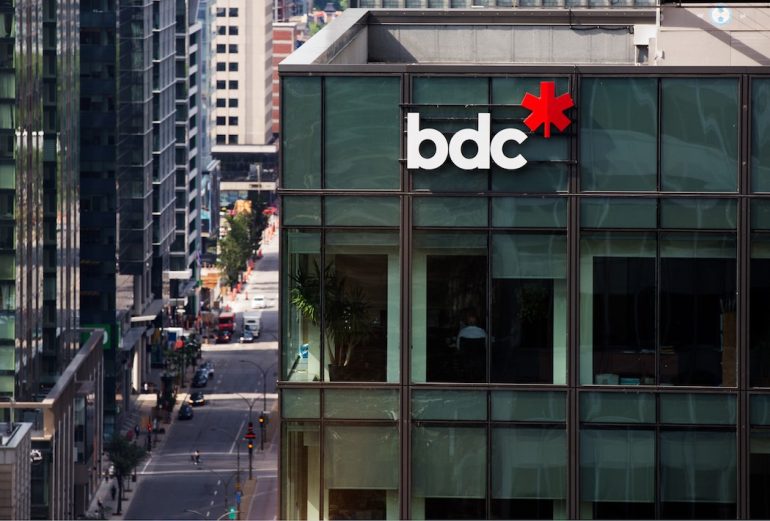The First Nations Bank of Canada (FNBC), an Indigenous-owned national bank, and the Business Development Bank of Canada (BDC) have announced a $100-million CAD joint initiative to help Indigenous communities and economic development agencies finance the purchase of established businesses.
“A development bank is there to play where others are not—until they follow.”
Isabelle Hudon, BDC
In a news release, Montréal-headquartered BDC and Saskatoon’s FNBC said they aim to increase and hasten business acquisitions by Indigenous organizations “in the spirit of economic reconciliation.” They plan to do this across Canada by providing loans to support these purchases—just as a wave of older Canadian entrepreneurs are gearing up to retire and sell their companies.
In an interview with BetaKit, BDC president and CEO Isabelle Hudon described this initiative as a step towards economic reconciliation, which the Government of Canada-owned Crown corporation hopes to do more to facilitate.
This $100-million commitment from BDC will be used to guarantee these loans and cover up to 85 percent of the risk in the event of a default. FNBC will underwrite and issue the loans using its own capital. BDC and FNBC expect the average deal size to be $5 million. While acquirers will typically be expected to bring additional capital to the table, loans may cover up to 100 percent of the price to purchase a business. Interest on these loans will depend on the risk rating, but most will be around seven to eight percent, and likely not above 10 percent.
This launch comes amid what the Canadian Federation for Independent Business (CFIB) hailed as a “succession tsunami” in a 2023 report. At the time, the CFIB found that 76 percent of small business owners planned to exit over the next decade, with three-quarters citing retirement as the reason. But the CFIB’s report also determined only one in 10 had a formal succession plan, and the majority of respondents said finding a suitable buyer or successor was the biggest obstacle to developing one.
BDC and FNBC believe they can help solve this problem, and benefit both buyers and sellers, by financing more acquisitions by Indigenous organizations.
“The unique demographic challenge we face over the next few years is a major opportunity for Indigenous communities and their economic development agencies,” FNBC president and CEO Bill Lomax said in a statement. “It will allow them to acquire companies with strong track records. And with Indigenous ownership, the companies will be more competitive for many reasons including procurement policies that favour Indigenous-owned businesses.”
RELATED: BDC hopes to reverse trend of declining entrepreneurship through Community Banking initiative
Hudon said Indigenous individuals and organizations often struggle to access the capital required to finance acquisitions. She added that “the trust factor” is often missing between Indigenous entrepreneurs and BDC and other financial institutions.
Given this, Hudon said BDC decided to partner with FNBC, which has more trust among Indigenous communities and a better understanding of their needs.
Hudon anticipates many of these loans will fund purchases of service companies, but indicated BDC and FNBC are open to financing a wider variety of different business acquisitions.
This joint financing vehicle is part of BDC’s Community Banking initiative, which it announced last year to provide financing and support to underserved entrepreneurs across the country and help reverse a decades-long decline in entrepreneurship.
At the time, BDC said it planned to partner with more than 80 community-based lending organizations, providing selected groups with co-lending, indirect lending, loan guarantees, and advisory services.
RELATED: BDC earmarks $250 million CAD to support underserved entrepreneurs
FNBC joins Futurpreneur, the Federation of African Canadian Economics, and Evol as community lending partners through BDC’s Community Banking initiative. BDC’s other financial institution partners currently include Desjardins, Meridian Credit Union, the Newfoundland and Labrador Credit Union, the TD Bank, and Vancity. In total, Hudon said BDC is now working with approximately a dozen partners through its Community Banking initiative.
Hudon said increasing funding for Indigenous entrepreneurs and other historically underserved groups has been “a huge focus” for BDC under her leadership.
When BDC reset its strategy and Hudon joined as president and CEO four years ago, she said it was determined the bank needed to expand its reach to serve not just a greater number of entrepreneurs, but also entrepreneurs “not getting the support from conventional financial institutions.”
“A development bank is there to play where others are not—until they follow,” Hudon said.
Hudon said BDC identified a need for it to do more to support Indigenous, Black, and women-identified entrepreneurs, and she alluded to the variety of funds and initiatives BDC has launched since 2021 to do that.
“Over the last four years, we’ve delivered on this,” she claimed.
In addition to announcing $100 million for a new Indigenous investment fund of its own last year, one that a BDC spokesperson told BetaKit “will be operational in the coming months,” the Crown corporation is also the lead investor in the $153-million Indigenous Growth Fund.
UPDATE (06/06/25): This story has been updated to include some additional information regarding the nature of these loans, BDC’s guarantees, and the status of BDC’s own Indigenous investment fund.
Feature image courtesy BDC.


